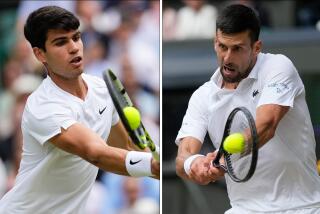Tennis / Thomas Bonk : No Matter the French Results, Wimbledon Is Island Unto Itself
- Share via
PARIS — The French Open comes to an end today, which means it’s time to say goodby to red clay for another year and wonder if anything at all that happened on it will mean anything at Wimbledon.
“Probably not,” Bud Collins said. “From the results at the French, you can tell who’s earnest, but that’s about it. I mean, (Mats) Wilander won here (last year) and he was earnest, but it didn’t do him any good at Wimbledon.”
Collins, a commentator for NBC and a columnist for the Boston Globe, is never short of opinion. He has written a book called “My Life With the Pros,” an account of his television and newspaper career covering professional tennis.
Collins has already handicapped Wimbledon.
“(Boris) Becker, I would think, would be a big favorite,” he said. “And (John) McEnroe is always a major figure, I think. Unfortunately, he was playing so well and then everything was set back because of his back injury.
“But you never know with him, either. He played so well here last year and then stunk things up at Wimbledon.”
Known for a sharp wit, his colorful nicknames for players--Steffi Graf is Fraulein Forehand--and his often outrageous attire, Collins began covering tennis in 1955 for the Boston Herald.
“My sports editor assigned me to it and he was very apologetic about it,” Collins said. “Everybody knew the tennis beat was always given to the new man, the staff drunk or an old guy they were phasing out. My daughter asked me which one of the three I was.”
Collins later added television as another vehicle for his commentary, which seemed only natural, and now his bearded, smiling face is a familiar sight, especially at Wimbledon.
“It’s like the key tennis event for people who catch only one tournament a year,” he said. “Wimbledon--it’s so much a mystery, it’s got this natural attraction.”
Because McEnroe probably attracts more attention than any player in the world, when he plays the most important tennis tournament in the world, the interest in him is staggering. Last year, McEnroe made the round of 16 at Roland Garros, but lost in the second round at Wimbledon, which reminded Collins of a story.
Collins said he ran into Bjorn Borg and asked him how McEnroe could play so well on clay and so poorly on grass.
“Oh, it’s easy,” Borg told Collins. “He’s slow now. He’s not fast enough for grass, so he doesn’t mind the slow clay.”
Collins’ book is full of such anecdotes culled from his television and newspaper career. He is mostly pleased with the finished product, but thinks it may have one shortcoming.
“Not enough sex,” he said.
Shop talk: Michael Chang said if he weren’t playing tennis for a career, he’d probably get a job in freshwater marine research.
The night his match against Jim Courier was suspended because of darkness, three bags of food from McDonald’s were rushed to Andre Agassi in the players’ clubhouse at Roland Garros.
Agassi was hungry. He was also homesick. After a week in Rome and two weeks in France, Agassi talked a good fight but played as if he didn’t want to be here while he was losing to Courier.
Agassi took the first flight home to Las Vegas. He reaffirmed his decision to omit Wimbledon from his schedule and came up with the quote of the tournament before he departed: “Mats wants to win it, Lendl wants to win it, I just want to go home.”
Unless he changes his plans, Agassi will not play another competitive match until the Davis Cup. That means Agassi won’t have played for six weeks before the U.S. showdown against West Germany, July 21-23 in Munich.
Even though he couldn’t wait to leave, Agassi said he felt better appreciated in Europe.
“I would say that I get the best response from the Europeans,” he said. “I depend on the U.S. for criticism. (Pause) Constructive criticism. (Pause) Supposedly. (Pause) I doubt it.”
In the yearly vote of French tennis reporters, the winner of the orange award for the most pleasant player at the French Open was Jakob Hlasek of Switzerland.
The lemon award, for the sourest player, went to Agassi.
“I’m glad I won something,” he said.
First Steffi Graf, then Monica Seles, now . . . ?
With the accent on youth in the women’s ranks at the French Open, a Florida girl one month past her 13th birthday has drawn a lot of interest.
Jennifer Capriati of Lauderhill, a finalist in the junior girls singles at Roland Garros, is waiting until she can turn pro at 14.
Capriati’s parents petitioned the Women’s International Tennis Assn. to allow her to turn pro at 12, but the WITA stood by its rule that a player must be at least 14.
The lone dissenting vote was cast by WITA board member Chris Evert, whose father, Jimmy, was Capriati’s first coach at Holiday Park in Ft. Lauderdale.
More to Read
Go beyond the scoreboard
Get the latest on L.A.'s teams in the daily Sports Report newsletter.
You may occasionally receive promotional content from the Los Angeles Times.










